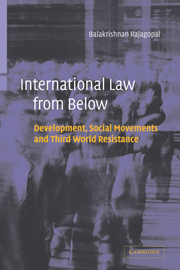Book contents
- Frontmatter
- Contents
- Abbreviations
- Preface and Acknowledgments
- Introduction
- PART I International law, development, and Third World resistance
- PART II International law, Third World resistance, and the institutionalization of development: the invention of the apparatus
- 3 Laying the groundwork: the Mandate system
- 4 Radicalizing institutions and/or institutionalizing radicalism? UNCTAD and the NIEO debate
- 5 From resistance to renewal: Bretton Woods institutions and the emergence of the “new” development agenda
- 6 Completing a full circle: democracy and the discontent of development
- PART III Decolonizing resistance: human rights and the challenge of social movements
- PART IV Epilogue
- References
- Index
4 - Radicalizing institutions and/or institutionalizing radicalism? UNCTAD and the NIEO debate
from PART II - International law, Third World resistance, and the institutionalization of development: the invention of the apparatus
Published online by Cambridge University Press: 09 July 2009
- Frontmatter
- Contents
- Abbreviations
- Preface and Acknowledgments
- Introduction
- PART I International law, development, and Third World resistance
- PART II International law, Third World resistance, and the institutionalization of development: the invention of the apparatus
- 3 Laying the groundwork: the Mandate system
- 4 Radicalizing institutions and/or institutionalizing radicalism? UNCTAD and the NIEO debate
- 5 From resistance to renewal: Bretton Woods institutions and the emergence of the “new” development agenda
- 6 Completing a full circle: democracy and the discontent of development
- PART III Decolonizing resistance: human rights and the challenge of social movements
- PART IV Epilogue
- References
- Index
Summary
By the time of the First World War itself, there were elements of a ‘universal’ international society, but this was not consolidated and quickened until the Second World War. A real revolution was occurring in world affairs, as non-Christian states were admitted to the international ‘community’ for the first time in several centuries as a result of the revolt against the West. As is well known, during the 1950s, 1960s, and 1970s, these new states took charge of the UN and its specialized agencies due to their numerical superiority, and attempted to transform international law through the use of UNGA resolutions, the establishment of new international institutions and the introduction of new elements into the doctrinal corpus of international law such as the doctrine of Permanent Sovereignty over Natural Resources (PSNR). This was done under the umbrella of the NIEO, which broadly called for structural changes in the world economy that the new nations desired, in the interests of justice, world peace, and development.
This chapter provides an analysis of the important moments that characterized this Third World engagement with (what was still then) a European international law. My analysis differs, however, from the traditional historiographies of the NIEO, which treat NIEO as a failure and attribute that failure to its radicalism and lack of realism. Instead, the NIEO constituted a moment of radical challenge to international law that resulted in transforming and expanding the reach of international law, but it was also inherently limited in the extent of its radicalism.
- Type
- Chapter
- Information
- International Law from BelowDevelopment, Social Movements and Third World Resistance, pp. 73 - 94Publisher: Cambridge University PressPrint publication year: 2003



